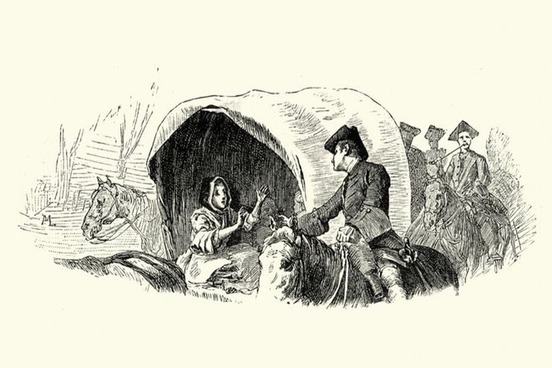
Yegg
Definition - safecracker
There has been considerable speculation, none of it conclusive, regarding the origin of the word yegg. Theories include that it was the name (or a variant) of a notable safe-cracker, that it was borrowed from a Chinese dialect, and that it was simply a variation of some existing English word. We may not know exactly where the word comes from, but we do know that it came into use in the early 20th century, and has since fallen into a relative state of disuse.
Two yeggs blew the safe in H. C. Sass’ grocery and bakery at Rising Sun, O., and escaped with $400 in cash.
— The Democratic Banner, (Mount Vernon, OH), 1 Jan. 1915

Abactor
Definition - one who steals cattle
To many a beginning thief, cattle may seem like a daunting or impractical thing to steal. They are large enough to not fit easily in a pocket, have an unfortunate tendency to leave droppings of indeterminate consistency, and may be possessed of an intractable streak when they do not want to move. All this notwithstanding, bovine-theft has played a large part in humanity’s history of taking things that might belong to someone else. We even have a variety of words for the person who takes another’s cows; if you prefer a common word you may use rustler, and if you prefer to add an Australian flair you may go with gully-raker.
The phrase that here follows in this matter of oxen, not breaking in and not going out, is not improbably to express the safety of their herds, not only from straying, but, as in time of warr, from invaders and abactors, whose breaking in, breaking down or fall of the partition, or wall … is attended with the cattels passing through, or going out.
— Henry Hammond, A Paraphrase and Annotations Upon the Books of Psalms, 1659

Marauder
Definition - one who roams from place to place making attacks and raids in search of plunder : one that marauds
Marauder and maraud come from the French word for “vagabond,” which is also maraud.
Great Depredations having been committed by a Number of Marauders, in the Neighbourhood of Francfort, a Detachment of the Garrison marched in Pursuit of them, came up with them near a Wood, engaged them, killed two and made several Prisoners.
— The Derby Mercury (Deerby, Eng.), 28 Oct. 1743

Jackroller
Definition - one who robs a drunken or sleeping person
If filching from the inebriated is your thing then do we have a treat for you today — not one, but two obscure words which you may apply to yourself. In addition to jackroller you may now self-describe as a lush worker, depending on which term you think best matches the dignity of your endeavors.
One of these theories is that Holmes, after a display of money and his jewelry in several bar rooms, was followed by clever, high-class “jack rollers” into the alley off Adams street, leading to the rear entrance of O’Connor’s buffet in the Republic building.
— Denver Post, 23 May 1908

Prigger
Definition - thief
For most of us, when we think of the word prig the first meaning that comes to mind is “one who offends or irritates by observance of proprieties (as of speech or manners) in a pointed manner or to an obnoxious degree” (or “that one kid who didn’t laugh at your joke about … never mind”). However, this sense of prig is thought to have come from an earlier one, which is “to steal.” Hence, one who prigs was known as a prigger.
A Prigger of Prauncers be horse stealers, for to prigge signifieth in their language to steale, & a Prauncer is a horse, so beinge put together the matter is plaine.
— Thomas Harman, A caueat for commen cursetors vvlgarely called uagabones, 1567

Brigand
Definition - one who lives by plunder usually as a member of a band
Brigand shares a root with brigade; both words come from the Italian brigare, meaning “to fight.” If one resembles a brigand one may be described as brigandish, and the word for the practice of engaging in such acts as a brigand is wont to is either brigandism or brigandage.
”Be saved by you! Rather a thousand deaths! You have killed Luiz, have killed my father, and now you would save me! Never! But, before throwing myself into these flames, I would tell you, brigand, wretch, monster, that I curse you!” And she disappeared.
— Rockford Journal (Rockford, IL), 26 Sept. 1874

Biblioklept
Definition - one who steals books
Biblioklept is one of a large number of words which are concerned with the many varieties of bookish people and begin with biblio-. In addition to the stealer of books we have bibliophage (“bookworm”), bibliolater (“one overly devoted to books”), bibliophobe (“a person with a strong dislike of books”), and bibliognost (“one that has comprehensive knowledge of books and bibliography”).
”If they injure the owners,” says Mr. Blades, with real tolerance, “they do no harm to the books themselves, by merely transferring them from one set of bookshelves to another.” This sentence has naturally caused us to reflect on the ethical character of the Biblioklept. He is not always a bad man.
— Saturday Review of Politics, Literature, Science, and Art (London, Eng.), 23 Oct. 1880

Saint Nicholas's clerk
Definition - thief, highwayman
Saint Nicholas's clerk has never been one of the more common terms for describing those sorts of people who like to take things that belong to other people, but it does have a certain ring to it. The word comes from the patron saint of travelers, St. Nicholas of Myra, and was formerly used in reference to highwaymen (“a thief who robs travelers on a road”).
Saint Nicholas, however, the English “Old Nick,” is in all countries the patron of schoolboys, thieves, or, as Shakspere calls them, “Saint Nicholas’s clerks.”
— Richard Ford, Gatherings from Spain, 1846

Freebooter
Definition - pirate, plunderer
The word freebooter has nothing to do with actual boots, and is only connected to free through another language. It came into English from the Dutch vrijbuiter, which may be traced to that language’s words meaning “free” (vrij) and “booty” (buit).
A Briefe conference of two Commaunders of different properties and Conditions. The one honorablie trayned in Royall Warres, gouerned by right Martiall Discipline. The other bred vp in disorderly ciuil dissentions among Freebooters, guided by lawlesse indiscretion.
— Thomas Digges, A breife and true report of the proceedings of the Earle of Leycester for the reliefe of the towne of Sluce, 1590

Footpad
Definition - a criminal who robs pedestrians
The footpad has some similarity with the aforementioned highwayman, insofar as both of these kinds of ruffians tend to focus on divesting travelers of their goods. Although now quite rare, footpad may also be found used as a verb, meaning “to behave in the manner of a footpad.”
The next we shall speak of, was one James Crouch a person that had but one hand, yet that doubled to do Mischief: for he had already been more than once burnt in that single hand, yet would take no warning; being now Condemned for that most abominable practice of the Foot pad, Knocking a man down with a piece of Iron (produced in Court) in Bunhill fields.
— Anon., The confession and execution as well of the several prisoners that suffered at Tyburn on Wednesday the 17th of April 1678, 1678

Pennyweighter
Definition - a thief that steals jewelry by substituting a fake for a valuable piece
Pennyweighter is a word that seems unjustifiably obscure when one considers that it may be used to describe the protagonists of dozens, if not hundreds, of heist films made over the past hundred years. The word comes from pennyweight jewelry, which itself comes from the English word pennyweight (“a unit of weight equal to ¹/₂₀ Troy ounce”).
”Don’t you know him? He is a penny-weighter. He has laid a plan with his moll to work the jewelry stores here. I tumbled to it—so I have blocked his game by ordering him to quit the town.”
— Monongahela Valley Republican (Monongahela, PA), 5 Aug. 1880





